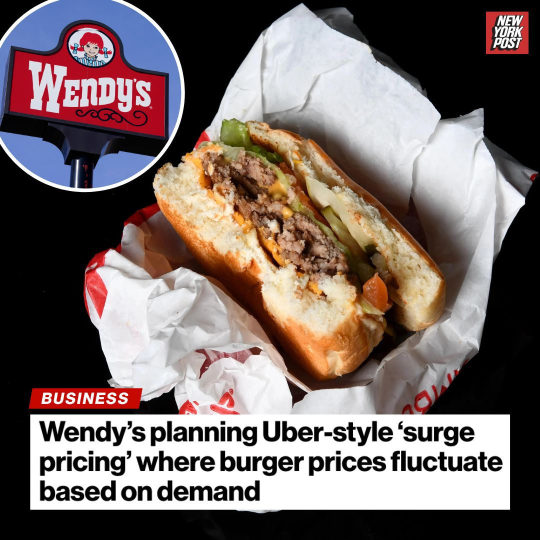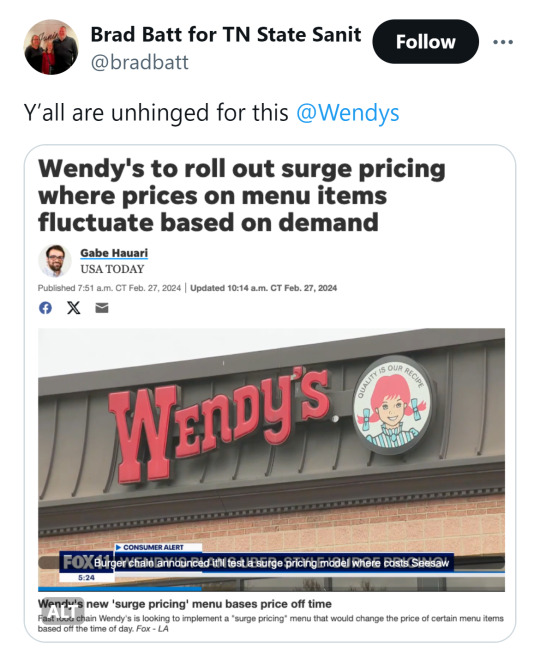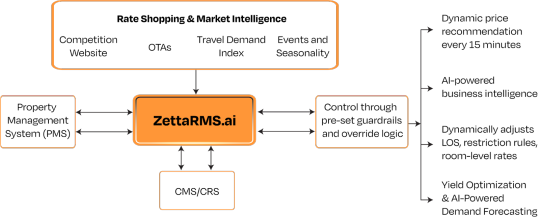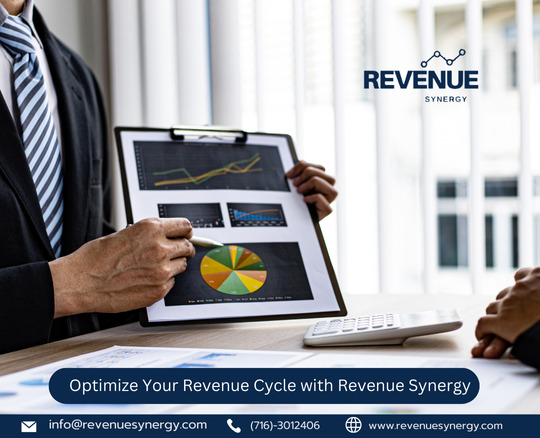#Revenue Optimization
Explore tagged Tumblr posts
Text




#Wendy’s#stupid#supply and demand#pricing strategies#consumer behavior#savings tips#happy hour deals#early bird specials#booking tips#off-peak travel#surge pricing#dynamic pricing#variable pricing#real-time pricing#revenue optimization#technological advances#fast food pricing#restaurant pricing#retail pricing#pricing trends
18 notes
·
View notes
Text
Bring Your Hotel Tech Together with Agentic AI-Powered ZettaRMS
A Unified Hotel Ecosystem with ZettaRMS: An AI-Powered Revenue Management Solution

ZettaRMS Workflow Overview Let’s take a look at ZettaRMS by Sciative, a system designed for seamless integration and quick connectivity with other hotel tech platforms, all with minimal setup time.
ZettaRMS is a unified hotel revenue management platform delivering AI-powered dynamic pricing for leading hotel chains around the world. With direct integrations to major Property Management Systems (PMS) and Channel Management Systems (CMS), ZettaRMS processes real-time data, analyzes competitor pricing across OTAs, and constantly tracks market demand—not in batches, but continuously. Every 15 minutes, it pushes optimized rates to OTAs, helping hotels maximize RevPAR and stay ahead of the competition.
But how do we manage rate shopping, assess demand, and update OTA pricing every 15 minutes with minimal lag?
Let’s dive into the ZettaRMS tech architecture and see how it delivers real-time pricing precision.
How ZettaRMS Powers a Unified Hotel Tech Ecosystem ZettaRMS is built with a modular, API-first approach, which means it connects easily with other hotel tech tools. It enables secure, real-time data sharing across systems, ensuring that all your platforms work in sync and pricing decisions are made quickly and automatically.
The core of this system is its integration with the hotel’s PMS. Using RESTful APIs, ZettaRMS keeps in constant contact with the PMS to sync room availability, restrictions, and booking updates in real time. Since hotel rooms are perishable inventory, even small delays can result in lost revenue. To avoid this, ZettaRMS uses low-latency, event-driven communication that instantly processes updates from the PMS.
This availability data is then combined with insights from the CMS. ZettaRMS continuously pulls in competitor pricing, package details, and distribution data. Its built-in rate shopping engine doesn’t rely on external batch-processing tools. Instead, it refreshes market data nearly in real time, helping hotels stay competitive across every channel.
Direct booking engines are also part of this connected setup. ZettaRMS ensures that the latest rates and room availability are pushed to your hotel’s own website too. This not only guarantees accurate pricing and inventory but also enables more effective, real-time direct booking campaigns.
All of this data—from PMS, CMS, booking engine, and external market signals—is analyzed by ZettaRMS’s advanced machine learning algorithms. These models process trends in bookings, lead times, length of stay, market rates, and past performance to recommend the best prices every 15 minutes, aligned with your revenue goals and market positioning.
Here’s how the full integration cycle works:
The PMS updates room availability.
It triggers an API call to ZettaRMS with the latest inventory and restrictions.
ZettaRMS gathers comp-set pricing from the CMS and evaluates market demand.
Every 15 minutes, ZettaRMS recalculates and sends optimal pricing to both the PMS and CMS.
Simultaneously, the booking engine receives updated rates and availability.
Prices across OTAs and the hotel website reflect the new data instantly, maintaining parity and eliminating manual updates.
Scaling Smart: Future-Proofing Hotels with Seamless Integration Disconnected hotel tech stacks slow growth, limit visibility, and hurt decision-making. In an environment where demand shifts constantly and guests expect instant results, outdated systems just won’t cut it. To stay competitive, hotels need smart, flexible, integrated solutions that support automation, real-time pricing, and scalable strategy.
ZettaRMS is built exactly for this. Whether you’re managing a boutique hotel or a large chain, it gives your team the power to respond to demand shifts instantly, optimize pricing across all channels, and grow revenue without adding operational overhead.
ZettaRMS Supports Growth with Powerful Tools Like:
Group Pace Reports: Monitor and compare current group bookings against past trends. Spot gaps and adjust early.
Pickup & Forecasting Tools: Track real-time bookings by channel, segment, and room type. Forecast demand and adjust strategies dynamically.
Corporate & Loyalty Pricing: Automate pricing rules for corporate clients and loyalty programs. Protect rate integrity and improve conversion.
Centralized Channel Management: Push pricing and inventory updates across all platforms at once. Reduce overbookings and maintain OTA rate parity.
Revenue Dashboards: Access real-time KPIs like RevPAR, ADR, occupancy, and pricing accuracy to make fast, informed decisions.
AI-Driven Dynamic Pricing: Machine learning models analyze historical data, market rates, and booking patterns to update pricing every 15 minutes.
Multi-Property Optimization: Customize strategies for each property while using portfolio-wide insights to maximize revenue across your group.
Smart Guardrails & Overrides: Use flexible pricing rules, thresholds, and fallback logic to stay in control of automated decisions.
Open API Architecture: Easily integrate with CRMs, upselling tools, or new partners in the future, without complex custom builds.
In today’s fast-moving hospitality landscape, success isn’t about using more tech—it’s about using smarter tech that works together. With ZettaRMS, you can automate pricing, adapt in real time, and drive sustainable growth without the hassle of manual processes.
For more about the blog visit: https://sciative.com/research-articles/unify-disconnected-hotel-tech-systems-with-agentic-ai
#business#hotels#revenue management system#dynamic pricing#pricing#revenuegrowth#revenue optimization#revenuemanagement
0 notes
Text
Streamlining Telecom Billing with SAP BRIM by Acuiti Labs
Acuiti Labs empowers telecom businesses with SAP BRIM to transform outdated telecom billing systems. Our solution automates mobile service invoicing, enhances telecommunication revenue management, and reduces revenue leakage—delivering scalability, transparency, and better customer experiences.
#telecom billing systems#mobile service invoicing#telecommunication revenue management#sap brim#sap billing#acuiti labs#q2c for telecom#billing automation#subscription billing#revenue optimization
0 notes
Text
0 notes
Text
Are claim denials hurting your practice's bottom line? This guide provides a practical, step-by-step approach to understanding Explanation of Reviews (EORs) in medical billing. Learn how to identify errors, appeal denials effectively, and optimize your revenue cycle for increased profitability. #medicalbilling #EOR #claimdenials #revenuecycle #healthcaremanagement
#Medical Billing#EOR#Explanation of Review#Claim Denials#Healthcare#Revenue Optimization#Medical Finance#Healthcare Management#Medical Coding#Insurance Claims
0 notes
Text
Optimize Your Revenue Cycle with Revenue Synergy

Streamline your healthcare practice with expert Revenue Cycle Management (RCM) services from Revenue Synergy, the best RCM company in the US. Whether you're managing billing and claim submission, EHR integration, or patient data analysis, our solutions are designed to optimize your revenue cycle. Specializing in RCM for urgent care and healthcare facilities, we help providers maximize revenue, reduce overhead costs, and focus on delivering quality care. Explore how our RCM outsourcing USA services can elevate your financial performance and efficiency today! Read more - https://revenuesynergy.com/revenue-cycle-management/
Read more - https://revenuesynergy.com/revenue-cycle-management/
#Revenue Cycle Management#RCM Services#Healthcare Billing#Medical Practice Consulting Texas#Claim Submission#EHR Integration#Patient Data Analysis#Healthcare Revenue Solutions#Revenue Optimization#Healthcare RCM
0 notes
Text
0 notes
Text
Revenue Cycle Management Market Will Grow At Highest Pace Owing To Increased Focus On Digitalizing Healthcare Billing Processes

Revenue cycle management (RCM) plays a critical role in healthcare organizations by handling all administrative and financial transactions related to patients, including registration, claims processing, payments, revenue generation, and reporting. RCM solutions assist in streamlining workflows to enhance organizational efficiency. It allows healthcare providers to accurately bill patients, insurance companies, and government agencies for clinical services rendered. Key advantages of RCM include improved billing accuracy, reduced claims denial, enhanced collection of valid receivables, and optimized revenue for healthcare organizations. Growing need to curtail escalating healthcare costs and digitize billing processes in the industry are fueling adoption of RCM solutions. The Global Revenue Cycle Management Market Size is estimated to be valued at US$ 156.68 Bn in 2024 and is expected to exhibit a CAGR of 11% over the forecast period 2024 to 2031.
Key Takeaways Key players operating in the Revenue Cycle Management are Athenahealth, Experian Health, Cerner, GE Healthcare, Coronis, Epic Systems, Conifer Health Solutions, eClinicalWorks, Change Healthcare, Optum, Waystar, McKesson Corporation, R1, Experian Health, Veradigm LLC, CareCloud Corporation, Access Healthcare, and AdvantEdge Healthcare Solutions. The growing demand for RCM solutions is attributed to increasing patient volume, rising healthcare insurance rates, complicated insurance regulations, and an aging US population requiring greater medical care. RCM tools assist providers in maximizing reimbursement through improved charge capture, billing accuracy, and collections. Technological advancements in cloud computing, artificial intelligence, and machine learning are boosting the growth of the RCM market. Vendors are increasingly leveraging emerging technologies to streamline workflows and develop intelligent solutions for claims processing, denial management, and payment posting. AI-enabled solutions are helping automate repetitive tasks and provide real-time insights into organizational performance. Market Trends There is growing adoption of cloud-based RCM solutions owing to benefits such as scalability, mobility, lower upfront costs, and easy access to real-time patient information. Cloud platforms are enabling improved collaboration between disparate healthcare organizations. Many vendors are offering SaaS-based models to drive market penetration. Mobile RCM technologies are also gaining popularity to support on-the-go access for physicians and financial counselors. Mobile apps allow capture of charges during patient consultations and improve connectivity with external partners. This is helping streamline workflows across care delivery settings.
Get More Insights On This Topic: Revenue Cycle Management Market
#Revenue Cycle Management Market#Healthcare Finance#Medical Billing#Claims Processing#Revenue Optimization#Financial Analytics#Healthcare Administration#Billing Software
0 notes
Text
Latest Blogs
Revenue Leakage
Revenue Operations
Revenue Assurance
RevOps Intelligence
Sales Pipeline
Revenue Strategies
Finops and Revops
Hybrid GTM
RevOps Metrics
Saas and RevOps
CRO
Revenue Intelligence
GTM Statistics
Net Retention Rate
Pipeline Velocity
NPS Calculations
RevOps Platform
ROI
Go to market insights
PLS vs SLG
Marketing Sales Chasm
Revenue Operations
GTM Partners
GTM Operations
GTM Analytics
GTM Efficiency
GTM insights
Revenue Leak
#revenue operations#revenue leakage#revenue leak#revenue intelligence#revenue assurance#Pipeline Velocity#revenue attribution#revenue optimization#GTM Partners
0 notes
Text

really rubbing it in, huh
#I mean. I like gmm but the format is very. yeah. optimized for clicks and ad revenue.#FORTY SOUPS!#boring text posts
4 notes
·
View notes
Text
Unveiling the Best SEO Worker in Bangladesh: Driving Digital Success
#https://dev-seo-worker-in-bangladesh.pantheonsite.io/home/: With years of experience and a deep understanding of search engine algorithms#[Insert Name] possesses unparalleled expertise in SEO strategies and techniques. They stay abreast of the latest trends and updates in the#ensuring that clients benefit from cutting-edge optimization practices.#Customized Solutions: Recognizing that each business is unique#[Insert Name] tailors their SEO strategies to suit the specific needs and goals of every client. Whether it's improving website rankings#enhancing user experience#or boosting conversion rates#they craft personalized solutions that yield tangible results.#Data-Driven Approach: [Insert Name] firmly believes in the power of data to drive informed decision-making. They meticulously analyze websi#keyword performance#and competitor insights to devise data-driven SEO strategies that deliver maximum impact.#Transparent Communication: Clear and transparent communication lies at the heart of [Insert Name]'s approach to client collaboration. From#they maintain open lines of communication#ensuring that clients are always kept informed and empowered.#Proven Results: The success stories speak for themselves. Time and again#[Insert Name] has helped businesses across diverse industries achieve unprecedented growth in online visibility#organic traffic#and revenue generation. Their impressive portfolio of satisfied clients serves as a testament to their prowess as the best SEO worker in Ba#Continuous Improvement: In the dynamic landscape of SEO#adaptation is key to staying ahead. [Insert Name] is committed to continuous learning and refinement#constantly refining their skills and strategies to stay at the forefront of industry best practices.#In conclusion#[Insert Name] stands as a shining beacon of excellence in the realm of SEO in Bangladesh. Their unw
3 notes
·
View notes
Text
Revenue Management Software for Hotels Guide
Introduction
The hospitality industry is highly competitive, and hotels must continuously adapt to fluctuating demand, seasonal trends, and market competition. Revenue management system (RMS) is a game-changer in this regard, enabling hotels to optimize pricing strategies, maximize revenue, and improve profitability.
In this guide, we will explore what revenue management system is, how it benefits hotels, key features to look for, and the best solutions available in the market.
What is the Revenue Management Software for Hotels?
Revenue management software is an AI-powered tool designed to help hotels set optimal room rates based on market demand, competition, historical data, and predective analysis. It automates pricing decisions, ensuring hotels charge the right price at the right time to maximize occupancy and revenue.
Hotels of all sizes, from small boutique properties to large chains, use revenue management system to streamline their pricing strategies and stay ahead in the competitive hospitality market.
Key Benefits of Hotel Revenue Management Software
1. Optimized Pricing Strategies
One of the primary advantages of RMS is its ability to optimize pricing strategies using dynamic pricing algorithms. These algorithms analyze real-time market conditions, including demand, competitor pricing, and seasonality, to adjust room rates accordingly. Instead of relying on guesswork, hotels can implement data-backed pricing strategies that maximize revenue while ensuring competitiveness. For example, during high-demand periods such as festivals or business conferences, RMS can increase room rates to capture more revenue, while in low-demand seasons, it can offer discounts to attract bookings and maintain occupancy levels.
2. Increased Revenue and Profitability
Revenue management system plays a crucial role in identifying revenue-boosting opportunities. By leveraging artificial intelligence and machine learning, RMS continuously analyzes booking patterns, customer behavior, and external factors to recommend the most profitable pricing strategies. This proactive approach helps hotels avoid leaving money on the table. For instance, if the software detects an increase in demand for a particular date, it can automatically raise prices to capitalize on the trend. Over time, these strategic price adjustments lead to higher average daily rates (ADR) and improved profitability.
3. Improved Forecasting and Demand Prediction
Accurate demand forecasting is essential for hotel profitability, and RMS excels in this area. By analyzing historical booking data, seasonal trends, and market conditions, the software predicts future demand fluctuations. This allows hotel managers to plan their pricing strategies, staffing, and inventory management accordingly. For example, if RMS forecasts high occupancy rates for a specific weekend, the hotel can adjust its pricing in advance and avoid last-minute pricing mistakes. Better forecasting also enables hotels to optimize their marketing campaigns by targeting customers at the right time with attractive deals.
4. Automated Pricing Decisions
Manually adjusting room rates can be time-consuming and prone to errors. RMS automates the entire pricing process, eliminating the risk of human error and ensuring optimal price adjustments based on data-driven insights. Hotel managers no longer need to constantly monitor competitor prices or manually input rate changes across multiple booking platforms. Instead, the software handles pricing updates in real-time, freeing up hotel staff to focus on enhancing guest experiences and service quality. This automation leads to greater efficiency and ensures pricing consistency across all distribution channels.
5. Competitive Analysis
To stay ahead in the hospitality industry, hotels must constantly monitor their competitors' pricing strategies. RMS includes built-in competitor rate analysis, allowing hotels to track pricing trends across different online travel agencies (OTAs) and direct booking platforms. This feature enables hotels to make informed pricing decisions by understanding how their rates compare to competitors. For example, if a competitor lowers their prices during a slow season, RMS can suggest whether the hotel should match or maintain its rates based on demand patterns. Competitive analysis helps hotels stay relevant and attract more bookings without underpricing their services.
Key Features to Look in Hotel Revenue Management Software
1. Dynamic Pricing Engine
A dynamic pricing engine is one of the most crucial features in hotel revenue management software. This feature automatically adjusts room rates in real time based on market demand, competitor pricing, seasonality, and booking trends. By leveraging data analytics, the system ensures that prices remain competitive and attractive to potential guests. For example, if a major event is happening nearby, the software can increase room rates accordingly to capitalize on high demand. Similarly, during low-demand periods, it can lower prices to encourage bookings and maintain occupancy levels. With a dynamic pricing engine, hotels can eliminate manual price adjustments and optimize revenue effortlessly.
2. AI and Machine Learning Capabilities
Artificial intelligence (AI) and machine learning are transforming the way hotels manage pricing and demand forecasting. AI-driven revenue management systems analyze vast amounts of data, including historical booking patterns, market conditions, and external factors such as holidays or weather changes. These insights allow the software to predict future demand accurately and recommend optimal pricing strategies. Over time, machine learning algorithms continuously improve their accuracy by learning from past trends. This ensures that hotels can make data-backed decisions rather than relying on intuition, ultimately leading to improved profitability and efficiency.
3. Competitor Rate Analysis
Staying competitive in the hotel industry requires constant monitoring of rival pricing strategies. A good revenue management system includes competitor rate analysis, which tracks and compares room rates across multiple platforms in real-time. Hotels can receive alerts when competitors adjust their prices, allowing them to respond accordingly. This feature provides a strategic advantage by helping hoteliers determine whether to match, undercut, or maintain their pricing. By keeping a close eye on the competition, hotels can make informed decisions that enhance their market position and profitability.
4. Forecasting and Demand Prediction
Accurate demand forecasting is essential for optimizing room rates and inventory management. Revenue management software uses historical booking data, seasonality trends, and external market conditions to predict future occupancy rates. For instance, if data shows that demand for rooms spikes during specific months or events, hotels can adjust prices in advance to maximize revenue. Additionally, forecasting helps with operational planning, such as staffing and resource allocation, ensuring that the hotel runs efficiently during peak and off-peak seasons. With precise demand prediction, hotels can avoid overpricing during low-demand periods and underpricing when demand is high.
5. Channel Management Integration
In today’s digital landscape, hotels distribute their rooms across multiple online travel agencies (OTAs), booking engines, and property management systems (PMS). A robust revenue management system seamlessly integrates with these platforms to ensure real-time updates on pricing and availability. This integration prevents overbooking and pricing discrepancies, which can lead to lost revenue or negative guest experiences. With channel management integration, hotels can maintain consistency across all sales channels, providing potential guests with accurate pricing and availability information at all times. This streamlined approach enhances operational efficiency and improves overall revenue performance.
Best Revenue Management Software for Hotels
Here are some of the top revenue management software solutions for hotels:
1. ZettaRMS
ZettaRMS is an advanced AI-driven Revenue Management System (RMS) developed by Sciative Solutions, specifically designed to enhance revenue optimization for the hospitality industry. By integrating sophisticated automation with human expertise, ZettaRMS enables hotels, villas, and homestays to implement effective pricing strategies.
Key Features of ZettaRMS:
Dynamic Pricing Optimization: ZettaRMSPrice utilizes artificial intelligence to automatically adjust room rates in real-time, ensuring that prices align with current market demand and supply conditions.
Comprehensive Market Analysis: The system continuously monitors various factors such as competitor pricing, local events, and historical booking patterns to provide data-driven pricing recommendations.
Seamless Integration: ZettaRMS integrates smoothly with existing hotel management systems, allowing for effortless implementation and minimal disruption to daily operations.
User-Friendly Interface: Designed with hotel revenue managers in mind, ZettaRMS offers an intuitive dashboard that displays actionable insights and key performance indicators, facilitating informed decision-making.
By leveraging these features, ZettaRMS enables hotels to stay competitive in a dynamic market, enhance profitability, and improve operational efficiency.
How to Choose the Right RMS for Your Hotel
When selecting a revenue management software for your hotel, consider the following factors:
Size of the Hotel: Some RMS solutions are better suited for large chains, while others cater to small boutique hotels.
Budget: Compare pricing plans to find a solution that fits within your budget.
Integration Capabilities: Ensure the RMS integrates smoothly with your existing PMS and booking channels.
Ease of Use: A user-friendly interface is crucial for effective implementation and daily operations.
Customization: Look for software that allows flexibility in setting pricing rules and strategies.
Customer Support: Reliable support is essential to resolve technical issues and ensure smooth operations.
Conclusion
Revenue management software is essential for modern hotels looking to optimize pricing, increase revenue, and stay competitive in a dynamic market. With AI-driven insights, automated pricing decisions, and seamless integration with booking platforms, RMS empowers hoteliers to make data-driven decisions that drive profitability.
Investing in the right RMS can significantly impact your hotel's revenue performance. Whether you're managing a single property or a hotel chain, choosing the best revenue management software tailored to your needs will help you achieve long-term success in the hospitality industry.
Are you ready to take your hotel's revenue strategy to the next level? Explore the best RMS solution today and unlock new growth opportunities!
0 notes
Text
How an Automated Scheduling System Can Transform Your Business Revenue in 2025

Businesses are increasingly turning to technology to streamline operations and maximize revnue. Among the most transformative solutions available today is an automated scheduling system, which has emerged as a critical tool for companies seeking to optimize their operations and boost profitability in 2025.https://precallai.com/
Why Your Business Needs an Automated Scheduling System in 2025
The landscape of business operations has fundamentally shifted, with the global appointment scheduling software market projected to grow from $546.1 million in 2025 to $1,518.4 million by 2032 at a CAGR of 15.7%. This explosive growth reflects the increasing recognition that an automated scheduling system is no longer a luxury but a necessity for competitive businesses.
Traditional scheduling methods are plagued with inefficiencies that directly impact revenue. Manual scheduling processes consume valuable employee time, lead to double bookings, create scheduling conflicts, and result in missed opportunities. An automated scheduling system eliminates these pain points while creating new revenue streams through improved capacity utilization and enhanced customer experience.
How an Automated Scheduling System Drives Revenue Growth
The revenue transformation potential of an automated scheduling system lies in its ability to optimize multiple aspects of business operations simultaneously. By automating the scheduling process, businesses can increase booking capacity by up to 30% simply by eliminating the time gaps that occur with manual scheduling.
Customer satisfaction improves dramatically when clients can book appointments 24/7 through an automated scheduling system. This accessibility leads to increased bookings, particularly from customers who prefer to schedule outside traditional business hours. The system's ability to send automated reminders reduces no-show rates by an average of 40%, directly protecting revenue that would otherwise be lost.
Furthermore, an automated scheduling system provides valuable data insights that enable businesses to identify peak demand periods, optimize pricing strategies, and allocate resources more effectively. This data-driven approach to scheduling management translates into measurable revenue improvements across all business operations.
Key Features of a Modern Automated Scheduling System
Today's automated scheduling system solutions offer sophisticated capabilities that extend far beyond basic appointment booking. AI and machine learning algorithms are increasingly being integrated into employee scheduling software to offer predictive scheduling, automated shift assignments based on employee availability, making these systems more intelligent and efficient than ever before.
A comprehensive automated scheduling system includes real-time availability updates, ensuring customers always see accurate booking options. Integration capabilities with existing CRM systems, payment processors, and communication tools create a seamless ecosystem that enhances operational efficiency. Advanced systems also offer multi-location support, resource allocation features, and customizable booking rules that adapt to specific business requirements.
The user experience aspect of an automated scheduling system cannot be overlooked. Modern systems provide intuitive interfaces for both customers and staff, reducing training time and improving adoption rates. Mobile compatibility ensures that scheduling management remains accessible regardless of location, supporting the growing trend toward remote and hybrid work environments.
Implementing an Automated Scheduling System: Strategic Considerations
Successful implementation of an automated scheduling system requires careful planning and strategic consideration of business-specific requirements. The first step involves analyzing current scheduling processes to identify pain points and opportunities for improvement. This assessment should include evaluation of booking volume, peak demand periods, resource availability, and customer preferences.
Choosing the right automated scheduling system requires evaluation of scalability, integration capabilities, customization options, and vendor support. The system should align with long-term business goals while providing immediate operational improvements. Implementation should be phased, starting with core scheduling functions and gradually expanding to include advanced features like automated marketing integration and analytics reporting.
Training and change management are critical components of successful automated scheduling system implementation. Staff members need comprehensive training on system functionality, while customers should be educated about new booking procedures. Clear communication about the benefits of the automated scheduling system helps ensure smooth adoption and positive reception.
ROI and Performance Metrics for Your Automated Scheduling System
Businesses increasingly adopt automation to streamline operations and improve efficiency, providing a total return of the initial investment of 172.73%. This substantial ROI demonstrates the financial impact that an automated scheduling system can deliver when properly implemented and optimized.
Key performance indicators for measuring automated scheduling system success include booking conversion rates, customer satisfaction scores, revenue per appointment, and operational efficiency metrics. Research shows that 80% of organizations will adopt intelligent automation by 2025, indicating that businesses without automated scheduling systems risk falling behind competitors.
The time savings generated by an automated scheduling system should be quantified and translated into cost savings. Administrative staff can redirect their efforts toward revenue-generating activities rather than manual scheduling tasks. This reallocation of human resources often results in immediate productivity improvements and cost reductions.
Future Trends and Innovations in Automated Scheduling System Technology
The automated scheduling system landscape continues to evolve rapidly, with artificial intelligence and machine learning capabilities becoming increasingly sophisticated. By 2025, the global appointment scheduling software market is projected to grow from $470.7 million in 2024 to $1.55 billion by 2032, at a CAGR of 16.1%, indicating sustained innovation and market expansion.
Predictive analytics capabilities within automated scheduling systems are becoming more refined, enabling businesses to forecast demand patterns and optimize resource allocation proactively. Integration with IoT devices, voice assistants, and other emerging technologies will create even more seamless scheduling experiences for customers.
The future of automated scheduling systems also includes enhanced personalization features that adapt to individual customer preferences and historical booking patterns. These systems will become increasingly proactive, suggesting optimal appointment times and services based on comprehensive data analysis.
Overcoming Common Automated Scheduling System Implementation Challenges
While the benefits of an automated scheduling system are substantial, businesses must navigate several common implementation challenges. Resistance to change among staff and customers represents the most frequent obstacle. This challenge can be addressed through comprehensive training programs, clear communication about system benefits, and gradual implementation strategies.
Technical integration challenges may arise when connecting an automated scheduling system with existing business software. Working with experienced vendors and conducting thorough compatibility testing helps minimize these issues. Data migration from legacy systems requires careful planning to ensure continuity of operations during the transition period.
Customer adoption of the new automated scheduling system may require incentives and education. Providing multiple booking options during the transition period, offering support for first-time users, and highlighting the convenience benefits helps encourage adoption and positive feedback.
Maximizing Your Automated Scheduling System Investment
To maximize the return on investment from an automated scheduling system, businesses should continuously monitor performance metrics and optimize system settings based on usage patterns and customer feedback. Regular system updates and feature utilization ensure that the automated scheduling system continues to deliver value as business needs evolve.
Staff training should be ongoing, with regular sessions covering new features and best practices. Encouraging staff feedback and suggestions for system improvements helps maintain engagement and identifies opportunities for enhanced functionality.
Customer feedback mechanisms should be integrated into the automated scheduling system to gather insights about user experience and satisfaction. This feedback drives continuous improvement efforts and ensures that the system continues to meet evolving customer expectations.
Conclusion: The Automated Scheduling System Advantage
The transformation potential of an automated scheduling system extends far beyond simple appointment booking. In 2025, businesses that embrace this technology will gain significant competitive advantages through improved operational efficiency, enhanced customer experience, and measurable revenue growth.
The investment in an automated scheduling system represents a strategic decision that impacts every aspect of business operations. From reducing administrative overhead to increasing booking capacity and improving customer satisfaction, the benefits compound over time to deliver substantial returns on investment.
As market trends continue to favor automation and digital transformation, the question is not whether your business needs an automated scheduling system, but rather how quickly you can implement one to start realizing these transformative benefits. The businesses that act decisively in adopting automated scheduling system technology will be best positioned to thrive in the competitive landscape of 2025 and beyond.
#Automated scheduling system#Business revenue transformation#Appointment scheduling software#Scheduling automation 2025#ROI automated scheduling#Business scheduling software#Revenue optimization tools#Automated booking system#Customer scheduling solutions#Digital scheduling platform#Automated scheduling system implementation#Business revenue growth automation#Appointment scheduling market trends#Scheduling system performance metrics#Automated scheduling ROI benefits
0 notes
Text
You Don’t Have to Go It Alone
How Freight Revenue Consultants Supports Growth Beyond the Back Office At Freight Revenue Consultants, we’re best known for our back-office support that gives trucking businesses all the benefits of factoring—without the high costs or funding complications. But that’s just part of what we do. Because helping you succeed isn’t just about invoices and collections. It’s about giving you the…

View On WordPress
#1:1 business consulting trucking#automate trucking business#back office efficiency trucking#back office training trucking#freight business expert speaker#freight consulting services#freight industry speakers#freight management consulting#freight process improvement#Freight Revenue Consultants#freight revenue training#improve trucking profitability#logistics business speaker#logistics education services#operational strategy for fleets#small fleet operations coaching#speaker on trucking finance#streamline trucking operations#transportation business strategy#trucking business education#trucking business mentoring#trucking business optimization#trucking systems training#trucking technology education#trucking webinars
1 note
·
View note
Text
Top Monetization Techniques to Grow Your Online Revenue
As I reflect on my journey to creating successful online businesses, I’ve come to realize that effective monetization strategies are the backbone of any thriving digital venture. It’s not just about generating revenue; it’s about aligning your income streams with your core business values and user expectations. I recall transforming struggling digital projects into profitable revenue engines by…
#Ad revenue optimization#Affiliate marketing tips#Digital monetization tactics#E-commerce revenue growth#Online revenue strategies#Passive income streams#Website monetization techniques
0 notes